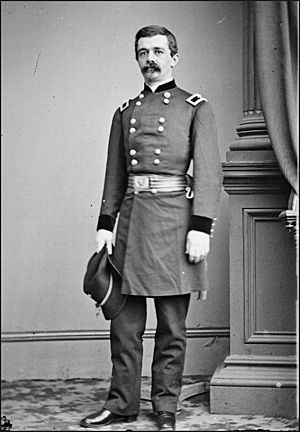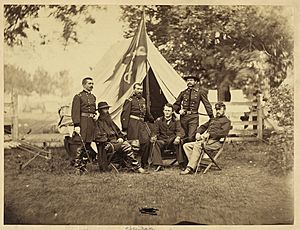Henry Eugene Davies facts for kids
Quick facts for kids
Henry Eugene Davies
|
|
|---|---|
 |
|
| Born | July 2, 1836 New York City, New York |
| Died | September 7, 1894 (aged 58) Middleborough, Massachusetts |
| Place of burial |
St. Luke's Churchyard, Beacon, New York
|
| Allegiance | United States of America Union |
| Service/ |
United States Army Union Army |
| Years of service | 1861–1866 |
| Rank | |
| Battles/wars | American Civil War |
Henry Eugene Davies (born July 2, 1836 – died September 7, 1894) was an American soldier, writer, and lawyer. He is best known for his service in the Union Army during the American Civil War. He started as a brigadier general and was later promoted to major general.
Davies was special because he was one of the few generals in the Union cavalry who wasn't a professional soldier before the war. He led his troops in many important battles, including the Overland Campaign, the Battle of Trevilian Station, the Siege of Petersburg, and the Appomattox Campaign.
Contents
Early Life and Education
Henry Eugene Davies was born in New York City. His father, Henry E. Davies, was a judge. Henry went to several colleges, including Harvard, Williams, and Columbia.
In 1857, he became a lawyer. He married Julia Rich in 1858, and they had one son, also named Henry Eugene. Henry Davies was also the nephew of another Union Army general, Thomas Alfred Davies.
Serving in the Civil War
When the Civil War began, Henry E. Davies joined the army. He became a captain in the 5th New York Volunteer Infantry Regiment. He fought in one of the first battles of the war, the Battle of Big Bethel, in June 1861.
In August 1861, Davies became a major in the 2nd New York Cavalry Regiment. This regiment was part of Major General Irvin McDowell's forces. They were very busy during the Second Manassas campaign.
Davies quickly moved up in rank. He became a lieutenant colonel in December 1862 and a colonel in June 1863. His regiment faced tough fighting at the Battle of Brandy Station and the Battle of Aldie in June 1863.
In September 1863, Davies was made a brigadier general. He served with great skill in the cavalry of the Army of the Potomac until the war ended. He was one of the few non-professional soldiers in the Union cavalry to become a general.
Davies's brigade was part of the 2nd Cavalry Division. This division was led by Brigadier General David McMurtrie Gregg. Davies's brigade included soldiers from New Jersey, New York, and Pennsylvania.
Key Battles and Campaigns
During the Overland Campaign in 1864, Davies's brigade joined Major General Philip Sheridan's raids towards Richmond, Virginia. They also fought in the Battle of Trevilian Station in June 1864. At the Battle of Haw's Shop, Davies's sword was cut in half by a bullet!
His brigade was also involved in battles during the Siege of Petersburg. They bravely defended their position at the Battle of Vaughan Road against a much larger enemy force. This battle was part of the bigger Battle of Peebles's Farm.
In December 1864, Davies's brigade raided the Weldon Railroad. Davies himself was wounded during the Battle of Hatcher's Run in February 1865.
President Abraham Lincoln recognized Davies's bravery. He nominated Davies to be a "brevet" major general, which is an honorary promotion, for his role in the Battle of Vaughan Road. This promotion was confirmed in March 1865.
End of the War
In March 1865, Major General George Crook took command of the 2nd Cavalry Division. Davies's brigade played a big part in the final cavalry operations. They helped the Union break through at Petersburg, which led to the Confederates leaving Petersburg and Richmond.
Davies's brigade was also crucial in the Appomattox campaign. They were the main Union force in the Battle of Amelia Springs. Near Paineville, Virginia, they destroyed about 200 Confederate supply wagons. They captured equipment, animals, and hundreds of prisoners. This campaign ended with the surrender of the Confederate Army at Appomattox Court House on April 9, 1865.
A staff officer, Major Henry E. Tremain, said that Davies's men were "as fine a body of cavalry for their size as could be found in the service." This shows how respected his troops were.
In June 1865, Davies was officially promoted to major general. He stayed in the army for a short time after the war, commanding a military district in Alabama. He then resigned on January 1, 1866.
Life After the War
After leaving the army, General Henry E. Davies became a well-known lawyer in New York. He also held several public jobs. He was the Public Administrator of New York City from 1866 to 1869. Then, from 1870 to 1873, he was an Assistant District Attorney for the United States.
Later, he went back to working as a private lawyer. He also moved to Beacon, New York. Davies wrote several books, including Ten Days on the Plains (1871). Two of his books, Davies Memoir and General Sheridan, were published after he passed away in 1895.
General Davies died suddenly on September 7, 1894, while visiting friends in Middleboro, Massachusetts. He was buried in St. Luke's Churchyard in Beacon, New York. He was survived by his wife and son.
 | Lonnie Johnson |
 | Granville Woods |
 | Lewis Howard Latimer |
 | James West |


